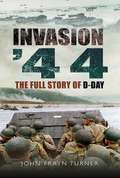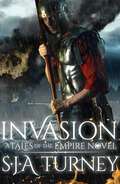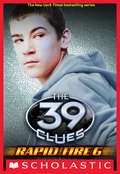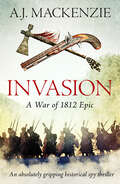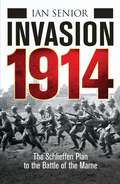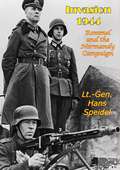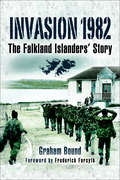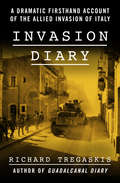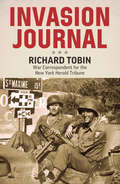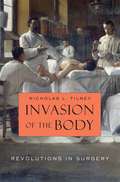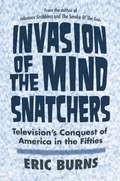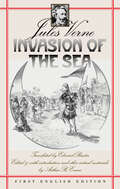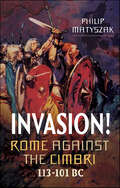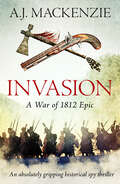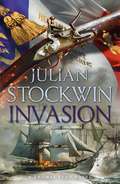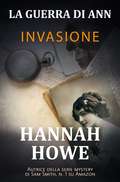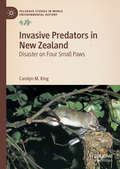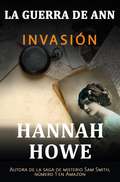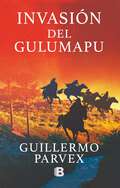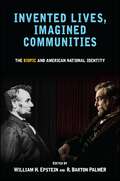- Table View
- List View
Invasion '44: The Full Story of D-Day (Airlife Classics Ser.)
by John Frayn TurnerIn the pre-dawn darkness of 6 June 1944, the greatest armada the world has ever seen began to disembark an Allied invasion force on the beaches of France's Normandy peninsula. Invasion '44 tells the story of that assault from the day over four years earlier, and only a few short weeks after the British disaster at Dunkirk, when a few individuals in the High Command began to turn their thoughts to the possibilities of an eventual return to the mainland, and the story continues up to the time when the Allied beach-head was firmly established on French soil. As the battle progresses, the reader is allowed to view each successive wave as it lands, follow the developing battle line inland, and keep an eye on the vital battles also developing on and beneath the seas off the Normandy peninsula and in the skies above it.
Invasion (Tales of the Empire)
by S.J.A. TurneyFor the glory of Empire!At the Empire’s northern edge lies Alba: strange, savage, unconquerable. Twenty years ago this rain-sodden island defeated a huge Imperial army. Now the Empire returns. Disgraced generals are looking for vengeance. Their forces are accompanied by three promising Tribunes: warlike Bellacon, intelligent Convocus and the joker in the pack, Cantex. As the armies journey into the interior, it becomes clear all is not as it seems. Beyond the realms of the Emperor, treachery is never far away. The invasion will be harder than anyone could have imagined. Can the Tribunes triumph against the odds? Or is this the very limit of Empire? Explosive and unputdownable,Invasionis perfectfor fans of Simon Scarrow, Conn Iggulden and George R.R. Martin.
Invasion (The 39 Clues: Rapid Fire #6)
by Clifford RileyThe sixth of seven brand new 39 Clues stories leading up to one explosive reveal. Dan Cahill loves hanging out with his new friend Atticus Rosenbloom a child prodigy whose genius IQ doesn't stop him from playing video games or practicing ninja moves. It's a relief to get to pretend to be a normal kid for once and not worry about finding Clues or looking out for Vespers. But when Atticus's house is attacked by strange intruders Dan has to rely on his Cahill training to keep them out. Are they normal burglars? Or does Atticus's family have a secret of its own?
Invasion (The War of 1812 Epics)
by A.J. MacKenzieA spy and a traitor lead American invaders against a beleaguered Canadian captain in this historical action thriller set during the War of 1812. May 1813. Under covering fire from their navy on Lake Ontario, US troops storm ashore at Niagara. Captain John MacLea and his reformed company of militia fight desperately but they and the other defenders are overwhelmed and forced to retreat. The American force is mightier than it has ever been, spearheaded by Colonel Peter Beauregard, a ruthless spy-master, and James Boydell, a Canadian captain, former friend of MacLea&’s, and traitor to his country. As the invading army closes in, and with no time left, the hope of an entire army, and all its men, rests on the shoulders of the most unexpected of people. Failure is not an option. They must succeed, or face total defeat. Perfect for fans of Adrian Goldsworthy, Bernard Cornwell, and Simon Scarrow.
Invasion 1914
by Ian SeniorFor a century, accounts of the German invasion of France and the opening year of the First World War have been dominated by histories of British troops and their experience in battle, despite the fact that the British Expeditionary Force comprised just four divisions, while the French and Germans fielded 60 each. Published to coincide with the 100th anniversary of the outbreak of the Great War, Invasion 1914 examines how the German invasion of France and Belgium came agonizingly close to defeating the French armies, capturing Paris and ending the First World War before the end of the year. Ian Senior reveals how the initial German strategy revolved around, and in part depended on, rapid victory over the French, and how the failure to achieve this resulted in the surprisingly fluid battles of the early days of the war deteriorating into the trench-based warfare which was to see the war drag on for another four years of unprecedented slaughter. Weaving together strategic analysis, diary entries, eyewitness accounts and interview transcripts from soldiers on the ground with consummate skill, this narrative is a timely investigation into the dramatic early months of the war, as the fate of Europe hung in the balance.
Invasion 1944: Rommel and the Normandy Campaign
by Lt.-Gen. Hans Speidel Col. Truman SmithLieutenant-General Hans Speidel's Invasion 1944 tells the story, from the German viewpoint, of one of the most critical periods of World War II. Indeed, to most Americans the summer months of 1944, highlighted by the battles on the Normandy beaches, represent the climax of the world convulsion. Every detail of this epic struggle is today of interest not only to those Americans who participated personally in the battles on the beaches and in the Normandy countryside, but to that still greater number who sweated and bled in Italy, on South Pacific isles, or in the Philippines, or were forced to stay at home. For the Norman beaches have now become a keystone in the arch of American military tradition--worthy to stand alongside Chancellorsville, Appomattox, Château-Thierry and the Meuse-Argonne. Our curiosity, therefore, cannot but be piqued as to what went on in the Château La Roche Guyon, the headquarters of the German Army Group opposing the Allied Normandy armies, as, day by day, American and British pressure brought Hitler's doom nearer.Invasion is by no means merely military history, a record of the estimates and orders of the German Command during the Normandy struggle. This book tells a double story. The battles are the background, while the foreground is dominated by the narrative of another climactic struggle, that between the commander of the Army Group, Erwin Rommel, "the Desert Fox," and his overlord Adolf Hitler."A notable contribution to the...literature on the Normandy campaign. The author was Chief of Staff successively to Rommel, Kluge and Model.... What he has to say about the German defeat is authoritative and of high interest."--New York Herald Tribune Book Review
Invasion 1982: The Falkland Islanders Story
by Graham BoundThe story of British Falkland Islanders under Argentine occupation—with a new chapter on postwar developments: “Reads like a gripping adventure yarn.” —British Heritage MagazineFalkland Islanders were the first British people to come under enemy occupation since the Channel Islanders during the Second World War. This book tells how islanders’ warnings were ignored in London, how their slim defenses gave way to a massive invasion, and how they survived occupation.While some among the small population established a cautiously pragmatic modus vivendi with the occupiers, some islanders opted for active resistance. Others joined advancing British troops, transporting ammunition and leading men to the battlefields. Islanders’ leaders and “troublemakers” faced internal exile, and whole settlements were imprisoned, becoming virtual hostages. A new chapter about Falklands history since 1982 reveals that while the Falklands have benefited greatly from Britain’s ongoing commitment to them, a cold war continues in the south Atlantic. To the annoyance of the Argentines, the islands have prospered—and an oil bonanza promises further riches.Includes a foreword by Frederick Forsyth
Invasion Diary: A Dramatic Firsthand Account of the Allied Invasion of Italy
by Richard TregaskisA dramatic and richly detailed chronicle of the Allied invasions of Sicily and Italy from one of America&’s greatest war correspondents. Following the defeat of Axis forces in North Africa, Allied military strategists turned their attention to southern Italy. Winston Churchill famously described the region as the &“soft underbelly of Europe,&” and claimed that an invasion would pull German troops from the Eastern Front and help bring a swift end to the war. On July 10, 1943, American and British forces invaded Sicily. Operation Husky brought the island under Allied control and hastened the downfall of Benito Mussolini, but more than one hundred thousand German and Italian troops managed to escape across the Strait of Medina. The &“soft underbelly&” of mainland Italy became, in the words of US Fifth Army commander Lt. Gen. Mark Clark, &“a tough old gut.&” Less than a year after landing with the US Marines on Guadalcanal Island, journalist Richard Tregaskis joined the Allied forces in Sicily and Italy. Invasion Diary documents some of the fiercest fighting of World War II, from bombing runs over Rome to the defense of the Salerno beachhead against heavy artillery fire to the fall of Naples. In compelling and evocative prose, Tregaskis depicts the terror and excitement of life on the front lines and recounts his own harrowing brush with death when a chunk of German shrapnel pierced his helmet and shattered his skull. An invaluable eyewitness account of two of the most crucial campaigns of the Second World War and a stirring tribute to the soldiers, pilots, surgeons, nurses, and ambulance drivers whose skill and courage carried the Allies to victory, Invasion Diary is a classic of war reportage and &“required reading for all who want to know how armies fight&” (Library Journal). This ebook features an illustrated biography of Richard Tregaskis including rare images from the American Heritage Center at the University of Wyoming.
Invasion Journal
by Richard L. TobinInvasion Journal, first published in 1944, is veteran war correspondent Richard Tobin's account of his time in England, aboard several Royal Navy fighting ships, and in France with American G.I.s shortly after the D-Day invasion. Offering interesting insights into English life – the food, morale of the civilians, V-1 bombings – as well as a look at Allied soldiers from its leaders to its soldiers and sailors, Invasion Journal portrays war-time life as it was for millions of people during the heady year of 1944. Of note is his coverage of the broadcasts by the Nazis of the unsuccessful attempt on Hitler's life on July 20, 1944. Tobin (1910-1995) was a reporter, editor, and war correspondent for The New York Herald Tribune from 1932-1956. From 1960-1976 he worked at The Saturday Review as a senior editor and executive.
Invasion of the Body: Revolutions in Surgery
by Nicholas L. TilneyIn 1913, the Peter Bent Brigham Hospital in Boston admitted its first patient, Mary Agnes Turner, who suffered from varicose veins in her legs. The surgical treatment she received, under ether anesthesia, was the most advanced available at the time. At the same hospital fifty years later, Nicholas Tilney—then a second-year resident—assisted in the repair of a large aortic aneurysm. The cutting-edge diagnostic tools he used to evaluate the patient’s condition would soon be eclipsed by yet more sophisticated apparatus, including minimally invasive approaches and state-of-the-art imaging technology, which Tilney would draw on in pioneering organ transplant surgery and becoming one of its most distinguished practitioners. In Invasion of the Body, Tilney tells the story of modern surgery and the revolutions that have transformed the field: anesthesia, prevention of infection, professional standards of competency, pharmaceutical advances, and the present turmoil in medical education and health care reform. Tilney uses as his stage the famous Boston teaching hospital where he completed his residency and went on to practice (now called Brigham and Women's). His cast of characters includes clinicians, support staff, trainees, patients, families, and various applied scientists who push the revolutions forward. While lauding the innovations that have brought surgeons' capabilities to heights undreamed of even a few decades ago, Tilney also previews a challenging future, as new capacities to prolong life and restore health run headlong into unsustainable costs. The authoritative voice he brings to the ancient tradition of surgical invasion will be welcomed by patients, practitioners, and policymakers alike.
Invasion of the Mind Snatchers: Television's Conquest of America in the Fifties
by Eric BurnsWhen the first television was demonstrated in 1927, a headline in The New York Timesread, “Like a Photo Come to Life. ” It was a momentous occasion. But the power of television wasn’t fully harnessed until the 1950s, when the medium was, as Eric Burns says, “At its most preoccupying, its most life-altering. ” And Burns, a former NBC News correspondent who is an Emmy-winner for his broadcast writing,knows about the impact of television. Invasion of the Mind Snatcherschronicles the influence of television that was watched daily by the baby boomer generation. As kids became spellbound by Howdy Doodyand The Ed Sullivan Show,Burns reveals, they often acted out their favorite programs. Likewise, they purchased the merchandise being promoted by performers, and became fascinated by the personalities they saw on screen, often emulating their behavior. It was the first generation raised by TV and Burns looks at both the promise of broadcasting as espoused by the inventors, and how that promise was both redefined and lost by the corporations who helped to spread the technology. Yet Burns also contextualizes the social, cultural, and political events that helped shape the Fifties-from Sputnik and the Rosenberg trial to Senator Joseph McCarthy’s Red Scare. In doing so, he charts the effect of television on politics, religion, race, and sex, and how the medium provided a persuasive message to the young, impressionable viewers.
Invasion of the Sea (Early Classics of Science Fiction)
by Jules VerneFirst English edition of a classic Verne novel. Jules Verne, celebrated French author of Twenty Thousand Leagues Under the Sea and Around the World in 80 Days, wrote over 60 novels collected in the popular series "Voyages Extraordinaires." A handful of these have never been translated into English, including Invasion of the Sea, written in 1904 when large-scale canal digging was very much a part of the political, economic, and military strategy of the world's imperial powers. Instead of linking two seas, as existing canals (the Suez and the Panama) did, Verne proposed a canal that would create a sea in the heart of the Sahara Desert. The story raises a host of concerns — environmental, cultural, and political. The proposed sea threatens the nomadic way of life of those Islamic tribes living on the site, and they declare war. The ensuing struggle is finally resolved only by a cataclysmic natural event. This Wesleyan edition features notes, appendices and an introduction by Verne scholar Arthur B. Evans, as well as reproductions of the illustrations from the original French edition.
Invasion!: Operation Sea Lion, 1940
by Martin Marix Evans Angus McgeochThis terrifying alternative reality is actually based on historical facts. The book follows the real course of events up to1 September, including the planning in Britain and Germany, and the aerial war. The fictional story then supposes that the Germans halted their advance in France along the Seine and the Aisne after the fall of Paris and that Marshal Petain conceded an armistice at that point. The Panzer divisions are thus able to rest and re-equip in northern France…A brilliant blend of meticulous research and imagination, this book is bound to appeal to anyone with an interest in the causes and effects of historical events, and indeed to anyone interested in world war history itself.
Invasion!: Rome Against the Cimbri, 113–101 BC
by Philip MatyszakPartly as a result of poor commanders and partly because the Romans had an innate and misguided belief in the invincibility of their legions, the first battles against the Cimbri were a series of disasters. These culminated in the Battle of Arausio in 105 BC when two Roman armies were utterly destroyed. Rome finally realized that their republic faced an existential threat, and made the necessary painful political and military changes that were needed to face that threat. Rome also found a commander who could take on the Cimbri. Caius Marius was a deeply flawed man – scheming, cautious to the point of cowardice, and quick to claim credit for the achievements of others. Nevertheless, he was a massive improvement on the leaders who had preceded him. The reshaped Roman army eventually worked out how to weather the savage onrush of the initial barbarian assault. Thereafter, the grim discipline of the legions was enough to wear down the opposition. It helped that Marius never fought unless the situation favored him, and as a result his army gradually became accustomed to victory. Had the Cimbri overwhelmed Rome, as at one time it seemed inevitable that they would, then European history would have been very different.
Invasion: An epic novel of historical adventure (War of 1812 Epics)
by A.J. MackenzieA crushing defeat, a deadly foe, an incredible feat of bravery...May 1813. Under covering fire from their navy on Lake Ontario, U.S. troops storm ashore at Niagara. Captain John MacLea and his reformed company of militia fight desperately but they and the other defenders are overwhelmed and forced to retreat.The American force is mightier than it has ever been, spearheaded by Colonel Peter Beauregard, a ruthless spy-master, and James Boydell, a Canadian captain, former friend of MacLea's, and traitor to his country.As the invading army closes in, and with no time left, the hope of an entire army, and all of its men, rests on the shoulders of the most unexpected of people. Failure is not an option. They must succeed, or face total defeat.A brutal, moving action-adventure thriller, steeped in intricate historical research, perfect for fans of Adrian Goldsworthy, Bernard Cornwell and Simon Scarrow.
Invasion: The Alternative History of the German Invasion of England, July 1940 (Greenhill Military Paperback Ser.)
by Kenneth MackseyThe WWII historian&’s bracingly accurate analysis of what might have happened if Hitler ordered Operation Sea Lion to breech the shores of England. In June 1940, German troops gathered just across the English Channel, poised for the invasion of Britain. With France defeated and Britain cowed, Hitler seemed ready for his greatest gamble. In this compelling alternative history, the Germans launch the invasion that, in reality, was never more than a plan. Landing between Dover and Hythe, German troops push inland supported by the Luftwaffe and the impregnable panzers, and strike out towards London. The British, desperate to defeat the invaders, rally and prepare for a crucial confrontation at Maidstone. Realistic, carefully researched and superbly written, Invasion is a classic of alternate history and a thought-provoking look at how Britain&’s war might have been.&“Macksey&’s blend of what actually happened and what might have been makes for a piece of writing comparable to Frederick Forsyth at his best.&” —Jack Higgins&“Convincingly described and excellently illustrated.&” —The Daily Telegraph, UK
Invasion: The Inside Story of Russia's Bloody War and Ukraine's Fight for Survival
by Luke HardingNew York Times bestselling author of Collusion and The Snowden Files Luke Harding&’s personal, frontline reporting on Russia&’s harrowing invasion of Ukraine, the biggest news event of the year and an inflection point in international politics&“An excellent, moving account of an ongoing tragedy.&” —Anne Applebaum, New York Times bestselling author of Twilight of DemocracyIn a damning, inspiring, and breathtaking narrative of what is likely to be a turning point for Europe—and the world—Guardian correspondent and New York Times bestselling author Luke Harding reports firsthand on the Russian invasion of Ukraine. When, just before dawn on February 24, 2022, Vladimir Putin launched a series of brutal attacks, Harding was there, on the ground in Kyiv. But this senseless violence was met with astounding resilience—from, among others, the country&’s embattled president, Volodymyr Zelenskiy—and the courage of a people preparedi to risk everything to preserve their nation&’s freedom. Here are piercing portraits of the leaders on both sides of this monumental struggle, a haunting depiction of the atrocities in Bucha and elsewhere, and an intimate glimpse into the ordinary lives being impacted by the biggest conflict in Europe since the Second World War. Harding captures this crucial moment in history with candor, insight, and an unwavering focus on the human stories that lie at its heart.
Invasion: Thomas Kydd 10
by Julian Stockwin'Paints a vivid picture of life aboard the mighty ship-of-the-line' - Daily ExpressNapoleon's forces are poised to invade Britain, and Commander Thomas Kydd's ship is at the forefront of the fleet defending the English coast. His honour restored after temporary disgrace in the Channel Islands, and reunited with his ship Teazer, Kydd seizes the chance to fight for his country. Then Kydd is abruptly withdrawn from the fleet and sent back to Dover on a secret mission to guard a mysterious American inventor. Having worked his way up from press-ganged seaman to captain of his own ship, Kydd is furious to find he will miss his opportunity to prove himself in battle. And Kydd's baffled superiors are equally angry to lose Kydd and his ship at such a dangerous time. Yet Kydd's role in the approaching war may be the most crucial part he has ever played.*********************What readers are saying about INVASION'Excellent in all respects' - 5 stars'Very compelling reading!' - 5 stars'I read ALL of the books by Julian Stockwin, he is an amazing author' - 5 stars'Yet another top-notch tale from the grand master of the age of fighting sail' - 5 stars'Julian Stockwin knows his craft . . . I lose myself in his books' - 5 stars
Invasion: Thomas Kydd 10
by Julian Stockwin'Paints a vivid picture of life aboard the mighty ship-of-the-line' - Daily ExpressNapoleon's forces are poised to invade Britain, and Commander Thomas Kydd's ship is at the forefront of the fleet defending the English coast. His honour restored after temporary disgrace in the Channel Islands, and reunited with his ship Teazer, Kydd seizes the chance to fight for his country. Then Kydd is abruptly withdrawn from the fleet and sent back to Dover on a secret mission to guard a mysterious American inventor. Having worked his way up from press-ganged seaman to captain of his own ship, Kydd is furious to find he will miss his opportunity to prove himself in battle. And Kydd's baffled superiors are equally angry to lose Kydd and his ship at such a dangerous time. Yet Kydd's role in the approaching war may be the most crucial part he has ever played.*********************What readers are saying about INVASION'Excellent in all respects' - 5 stars'Very compelling reading!' - 5 stars'I read ALL of the books by Julian Stockwin, he is an amazing author' - 5 stars'Yet another top-notch tale from the grand master of the age of fighting sail' - 5 stars'Julian Stockwin knows his craft . . . I lose myself in his books' - 5 stars
Invasione
by Maria Cristina Martinelli Hannah HoweMentre suo marito Emrys viene ancora dato per disperso in azione, Ann Morgan riceve un’offerta personale dall’affabile Ispettore Max Deveraux. Dovrebbe declinare o accettare la sua offerta? Invece, nella sua vita professionale, Ann si trova davanti a un dilemma. Dopo l’omicidio di Trevor Bowman, dovrebbe rilevare la sua agenzia investigativa? Proprio quando Ann sta riflettendo sugli aspetti personali e professionali della propria vita, un’amica le chiede di cercare sua figlia che è scomparsa. All’apparenza, Adeline Hopkins, la figlia, sta soffrendo per la relazione conflittuale che ha con il proprio padre. Però, che dire del suo ex-fidanzato e di un soldato americano, un Marine che ha frequentato brevemente? Con i soldati che si preparano per partire ed imbarcarsi per la seconda ondata del D-Day, Ann ha bisogno di risposte e finisce invece per trovarsi di nuovo di fronte a un altro quesito, il dilemma su come fare giustizia al meglio.
Invasive Predators in New Zealand: Disaster on Four Small Paws (Palgrave Studies in World Environmental History)
by Carolyn M. KingThe story of invasive species in New Zealand is unlike any other in the world. By the mid-thirteenth century, the main islands of the country were the last large landmasses on Earth to remain uninhabited by humans, or any other land mammals. New Zealand’s endemic fauna evolved in isolation until first Polynesians, and then Europeans, arrived with a host of companion animals such as rats and cats in tow. Well-equipped with teeth and claws, these small furry mammals, along with the later arrival of stoats and ferrets, have devastated the fragile populations of unique birds, lizards and insects. Carolyn M. King brings together the necessary historical analysis and recent ecological research to understand this long, slow tragedy. As a comprehensive historical perspective on the fate of an iconic endemic fauna, this book offers much-needed insight into one of New Zealand’s longest-running national crises.
Invasión
by Hannah HoweLa saga de misterio La Guerra de Ann es una saga de cinco novelas ambientadas en los años 1944/1945. Las historias son Betrayal, Invasion, Blackmail, Escape y Victory (títulos originales), cada una con aproximadamente 15 000 palabras. Estas se desarrollan cada cuatro meses y se publicarán cada cuatro meses, de forma que se puedan leer en tiempo real. Sin embargo, es posible que prefiera leerlas todas a la vez después de que se publique Victory. Es cuestión de gustos. Cabe mencionar que, en cada libro, hay un misterio que queda resuelto y que la historia de Ann alcanzará su conclusión tras la última publicación. Invasión Aún con su marido desaparecido, Ann Morgan recibe una oferta personal del apuesto detective Max Deveraux. ¿Debería declinarla o aceptarla? Mientras tanto, su vida profesional se ve afectada por un dilema: tras el asesinato de Trevor Bowman, ¿debería tomar las riendas de su agencia de investigación? Mientras Ann sopesa todos los aspectos de su vida personal y profesional, una amiga le pide que busque a su hija desaparecida. Parece que Adeline Hopkins, la hija, mantiene una mala relación con su padre. Sin embargo, ¿qué tienen que ver su exnovio y un soldado estadounidense con el que la joven estuvo saliendo brevemente? Mientras el ejército estadounidense se prepara para marcharse rumbo a la segunda ola de desembarcos, Ann necesita respuestas, las cuales la llevarán hasta un segundo dilema: ¿cuál es la mejor manera de impartir justicia?
Invasión del Gulumapu
by Guillermo ParvexContinuación de la novela en la que el periodista y escritor de no ficción se adentra en el imaginario mapuche a través del peñi Pedro Bórquez. Pedro Bórquez ha armado familia y una vida en el Gulumapu. Con esposa, hijos y buen vivir, el chileno que se adentró en tierras mapuche luego del terremoto que dejó Concepción en el suelo es el brazo derecho del lonko Mañilwenu, y junto a él consultará el cherrufe, la piedra mágica que le permite avizorar el futuro de su pueblo y el peligro que esas tierras corren por la amenaza de los chilenos. Segunda entrega de la exitosa ficción sobre el mundo mapuche que Guillermo Parvex inició con Frontera Sur y que, como lo hizo también en la ficción, cuenta con una fundamentación histórica que hace de esta novela un fiel retrato de los hechos que constituyeron a Chile como nación mestiza.
Inveighing We Will Go
by William F. Buckley Jr.Another collection of writing from William F. Buckley Jr., discussing such varied issues as the economy, religion, politics, education and communication.
Invented Lives, Imagined Communities: The Biopic and American National Identity (SUNY series, Horizons of Cinema)
by William H. Epstein; R. Barton PalmerBiopics—films that chronicle the lives of famous and notorious figures from our national history—have long been one of Hollywood's most popular and important genres, offering viewers various understandings of American national identity. Invented Lives, Imagined Communities provides the first full-length examination of US biopics, focusing on key releases in American cinema while treating recent developments in three fields: cinema studies, particularly the history of Hollywood; national identity studies dealing with the American experience; and scholarship devoted to modernity and postmodernity. Films discussed include Houdini, Patton, The Great White Hope, Bound for Glory, Ed Wood, Basquiat, Pollock, Sylvia, Kinsey, Fur, Milk, J. Edgar, and Lincoln, and the book pays special attention to the crucial generic plot along which biopics traverse and showcase American lives, even as they modify the various notions of the national character.
